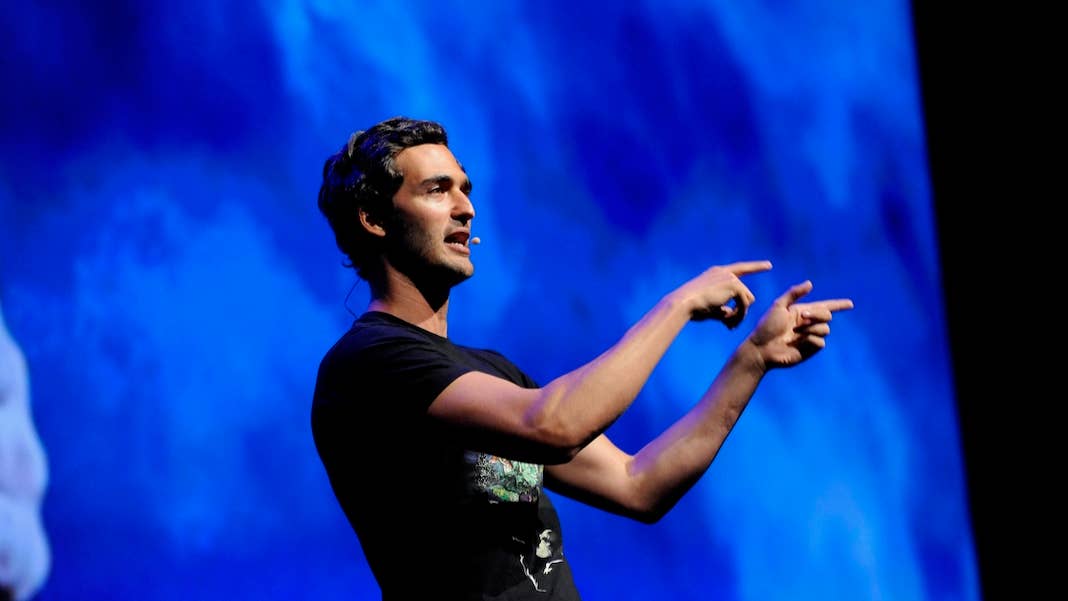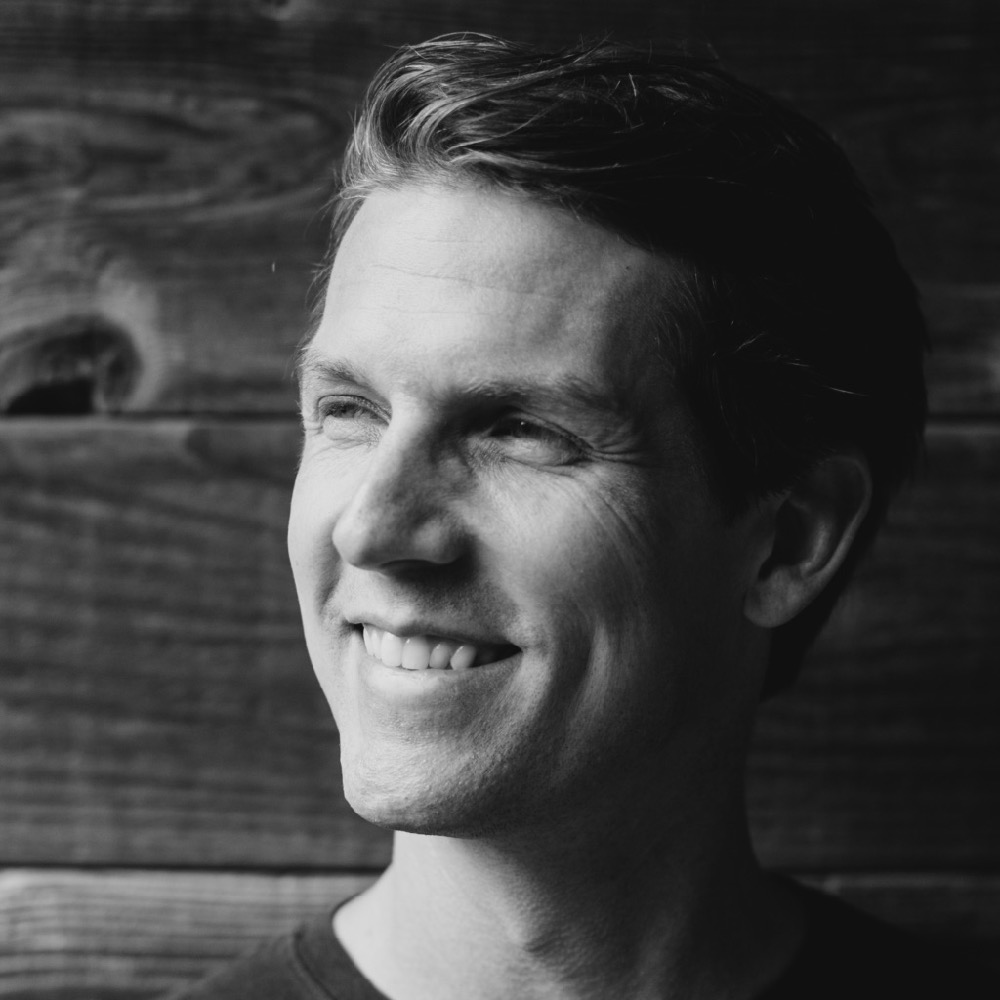In Depth With Jason Silva: Brain Games, Trance States, and The Abomination of Death
It’d been awhile, so we contacted Jason Silva to find out what gets him up in the morning these days. Though he’s added a mainstream audience, Silva seems eager as ever to chase the “adjacent possible” and leap over it into even dreamier domains. To learn why, among other things, he’s slightly disappointed Google Glass isn’t Scarlett Johansson, why privacy is malleable and mostly overrated, and how femto-scale computing at black hole densities accounts for the eery silence of the universe—read on.

Share
Jason Silva talks fast. His enthusiasm is contagious. The future, he says, is going to blow your mind. You have no idea. When I first talked to him, I had no idea. He was in Central Park to “get into the right head space” for the conversation.
Silva is best-known for his viral video shorts on technology and what it means to be human in the digital age. His mission is to bring a hopeful message of technological abundance to an audience that might otherwise not be listening.
In the year in between that Central Park conversation and our most recent interview, a few things have changed. For one, this time, Silva was in Las Vegas shooting the third season of the Emmy-nominated show Brain Games.
More broadly speaking, Silva has gained a global following. He gets recognized from Los Angeles to New York to Cambridge to the UAE. He’s delivered keynotes at just about every major tech firm, and an international school in Dubai has an after-school club dedicated to his Shots of Awe series.
Well, it’d been awhile, so we decided to find out what gets him up in the morning these days. Though he’s chatting with a wider audience, Silva seems eager as ever to chase the “adjacent possible” and leap into even dreamier domains.
To learn why he’s slightly disappointed Google Glass isn’t Scarlett Johansson, the concept of privacy is malleable and mostly overrated, and femto-scale computing at black hole densities accounts for the eery silence of the universe—read on.
Are you wearing Google Glass these days, and if not, why not?
I tried it at a party, but I haven't been given one yet. To be honest, when I tried it, I thought this is a mesmerizing device, a prototype of what's possible soon, but not completely smooth at the edges.
I’m kind of just waiting for the fluidity. I'm dealing with so much bandwidth as it is, and as they say, the best technology is the technology that gets out of the way and lets you do what you want to do.
You know, even when I use Siri on my iPhone, I want to be able to ask contextual questions, like what Kurzweil is working on at Google. I want Scarlett Johansson in the movie Her. It's like having a subservient goddess. It’s this perfect being that whispers in your ear beautiful, sweet nothings and runs your life.
Sounds lovely. You’re a man of projects in parallel. What’s the latest?
My whole thing has always been the passion project [alongside] my career in television. After I left Current TV, I was like, I'm going after my passion project. What started out as my "philosophical espresso shots" videos became very popular and initiated a whole speaking career. Then I partnered with TestTube, and we evolved philosophical espresso shots into my Shots of Awe series, which basically is a dream project.
In my videos, I’m connecting the role of technology in our lives back to the anxieties of the human animal—the worries that make us want to create to transcend our limits. And the depth and breadth of those ideas make the singularity more human; it contextualizes humans as the techno-social creatures that we are.
I did a series on AOL called The Future of Us, and then on the other end of the spectrum, I have Brain Games which is a mainstream TV show about the science of perception and just another entry point to ideas. It uses the games and the perceptual hacks to get people to have fun while learning about the brain.
But then that also sends them down the rabbit hole, because if they google Jason Silva...ho ho ho...they find Shots of Awe.
I'm attracting all these different people to content. I'm making the psychedelic, bohemian person learn about singularity; I'm making the techie, singularity person ponder impermanence and love; I’m making a romantic person who cares about love contemplate singularity and life extension.
Maybe this is a touch personal…but what reading material is in your bathroom, right now—what idea are you kind of obsessed with at the moment?
I've been obsessed for awhile with liminal trance states. I read a book by Janet Murray called Hamlet on the Holodeck, and it's about narrative and immersion.
Immersion is that phenomenon where you enter a sort of hypnotic, trance-like state and lose all sense of body awareness.
It happens when you’re enveloped in a story and a book. For me, my favorite moments are when you’re in a movie theater watching a film, maybe on Imax, and you just completely lose all body awareness, and the body, really the mind, enters a landscape of imagination, of archetype and myth.
It's a landscape of dream, a landscape that's not bound by the normal euclidean meat-space limitations, and it's also not bound by the rules of the everyday. You can call it the enchanted space. And I’m really interested in the techniques and rhetorical technologies we use to essentially hack subjectivity.
Perception and awareness moment to moment, that's how Erik Davis defines subjectivity. So, when you watch a movie, you're basically offering a dream space for somebody to inhabit for several hours—that’s unbelievable. Cinema is the spectral machinery of mind as Gene Youngblood describes it.
I've just become obsessed with the new tools that we'll use to engage ourselves and get lost in those liminal zones of story, dream, and poetry.
Have you tried Oculus Rift yet?
I am actually one of the sad people who have not tried it. But [I gather] it's a game-changer for virtual reality. And not just for the future of video games.
The director Chris Milk had this whole thing at Sundance where they're talking about the future of cinema through the lens of Oculus—putting you in worlds you've never been in, experiencing somebody else's experience. It reminds me a little bit of the movie Strange Days. [At Sundance], they were saying the holy grail of cinema is total reality capture, and that is, potentially, what the Oculus Rift will give us.
In the end, I'm interested in experience. I'm interested in the difference between washing the dishes and an experience of aesthetic arrest—the difference between wiping your dining room table and rhapsodic ecstasy. The difference between a song on the radio that you hate and a piece of music that moves you to tears.
Those are very different subjective experiences. I'm interested in engineering neural nirvana with chemical technology, electronic technology, rhetorical technology, whatever it is. I want to make subjective experience a work of art. That’s my new obsession.
There's a lot of talk about the dark side of tech these days. Two of the biggest themes I hear are: how automation and robots will put humans out of work and how technology is eroding privacy. So, why shouldn't folks worry about an Orwellian future governed by Google-bots, a tech elite, and the NSA?
Well, look, Kurzweil notes that 100 years ago, 80% or 90% of the jobs were agricultural farming jobs, and today, they're less than 1%—or some ridiculous figure like that—and yet they yield more than 100 years ago. And the world didn't end, right?
The fact that we use technology to become more productive and accelerate efficiency makes everybody think, well, we're going to lose our jobs. But I think new jobs are going to emerge. We will find other ways to occupy our time.
And, really, the full flourishing of these emerging technologies is going to lead us toward a world of abundance anyway.
It's a post-scarcity universe where we can nanoengineer anything we'll ever need and have in-vitro meats to feed everybody. Even the most extreme form of poverty is all but eradicated now across the world—there was a New York Times article about that.
So, I'm optimistic. Will there be growing pains? Will there be transitionary moments of panic? Sure. This stuff is happening faster and faster and faster, and we don't have a generational span of time to adjust. But again, I'm an optimist.
What about the erosion of privacy?
Be Part of the Future
Sign up to receive top stories about groundbreaking technologies and visionary thinkers from SingularityHub.


I don't think it's a bunch of agents sitting on their computers spying on me—it’s smart algorithms that are on the lookout for people that are planning violence against other people, terrorism.
I really don't think the government cares what porn sites people go to. I think they're more concerned with violence, extremism, illegal acts.
We’re all in it together, so there's going to be more and more monitoring. I don't really worry much because I don't partake in activities that are questionable of that nature.
But maybe people are worried about what some future, even less scrupulous government might do with those powers, that it’s a slippery slope.
Society is getting more liberal, more progressive right? The vast majority of Americans now support marijuana legalization. Maybe at one time you were afraid of privacy incursions, that they want to check my urine at work to see if I get high. Well, soon that's not going to be an issue because society is going to be comfortable with pot.
As we grow more progressive, a lot of the things we were concerned about when it comes to privacy won’t really be concerns anymore. And the stuff we really want to hide is maybe the stuff we should be worried that we want to hide to begin with.
Carl Sagan said, “There are not yet any obvious signs of extraterrestrial intelligence and this makes us wonder whether civilizations like ours always rush implacably, headlong toward self-destruction.” What do you think of his suggestion?
I think the most compelling case to account for Fermi's Paradox is the transcension hypothesis. (I did a video on the transcension hypothesis for AOL’s Future of Us.)
I sincerely believe it: Whole brain emulation, digital mind, and we start living in virtual spaces, get rid of our bodies, spawn a generation of digital sentience and then humans die out. [To be clear], humanity won't have died out—just the physical manifestation of it.
Those digital minds will operate on the densest possible computational substrate, femto-scale computing, black hole-like spaces, and you disappear from the visible universe—the intelligent civilizations are just not observable by us. Simple as that.
How will all this affect you personally? Like 50 years from now what will Jason Silva be? An 80-something that looks and feels like he’s forty? A digital consciousness that’s left his body behind?
So, funny. I think about all of these ideas in such a poetic way; I never think about them specifically about myself. At least not in normal everyday consciousness.
But when I'm contemplating in the landscape of dream and imagination and myth, I envision something akin to Inception or Vanilla Sky or films in which characters inhabit spaces of mind that are the same as physical spaces, but where reality is rendered in real time at the speed of thought and where the entire world becomes the extension of one's mind. We all move into universes of our own construction, as McKenna says.
So, I think we each sort of inhabit more and more of a dream space. Already, when we're interfacing with the Internet, smartphones, films—most of us live in a mind space most of the time already.
I mean, we really only occupy the physical day-to-dayness when we feed ourselves or when we go to the bathroom. Consciousness lives in that liminal space, and I think it'll be more of that and less of the banal going to bathroom stuff.
I interviewed a filmmaker last year about his Kickstarter campaign to make a movie called “The Last Generation to Die” about radical life extension. It’s a pretty provocative line of thinking. Will our parents be the last humans to die without having any say in the matter? Or maybe it’s us?
That to me is an abomination. I can't fathom it. The dream would be to save our parents, wouldn't it? I mean my whole interest in this stuff came from being unable to contemplate the mortality of my parents. Just being unwilling to accept ever having to come to terms with something so horrific. How do we address this horrific imposition by a supposedly meaningless universe? Well, if the universe works through us, and we are it and it is us—then we can change the rules.
It’s still the beginning of the year (sort of) what are some big developments we might see in 2014?
I'm very excited about the quantified self movement [making progress toward] a tricorder or iPhone-sized device that can diagnose you better than ten board-certified doctors. The bureaucracy of healthcare makes me want to vomit sometimes.
Look, we need to get our act together.
We need to upgrade our biology like we upgrade our iPhones. We need an iPhone-like device scanning our bodies for cancer and sending little software patches to nanocells in our skin to reprogram our biochemistry and our genes. We need to start mastering the software of life to maximize the healthspan of the human being. That's big and I'm very excited about the next twenty years of that. It has to happen.
Image Credit: Life@Microsoft Australia/Flickr; 2Top/Flickr; AlicePopkorn/Flickr; Electronic_Frontier_Foundation/Flickr; Adam Baker/Flickr
Jason is editorial director at SingularityHub. He researched and wrote about finance and economics before moving on to science and technology. He's curious about pretty much everything, but especially loves learning about and sharing big ideas and advances in artificial intelligence, computing, robotics, biotech, neuroscience, and space.
Related Articles

How Scientists Are Growing Computers From Human Brain Cells—and Why They Want to Keep Doing It

Scientists Say We Need a Circular Space Economy to Avoid Trashing Orbit

Scientists Race to Deliver Custom Gene Therapies for Incurable Diseases in Weeks—Not Years
What we’re reading



